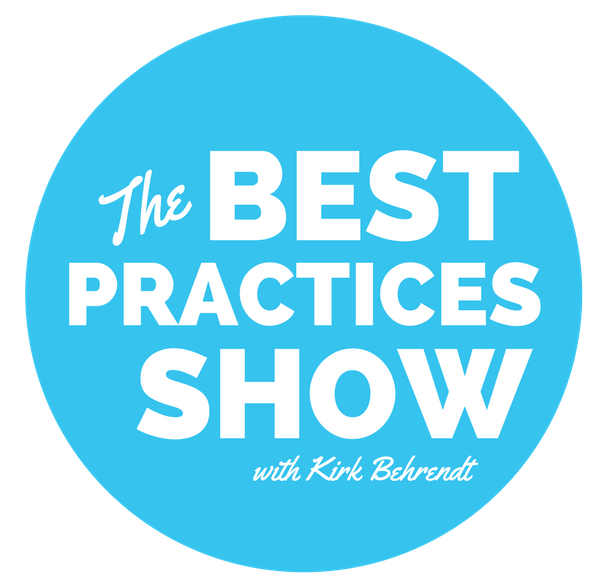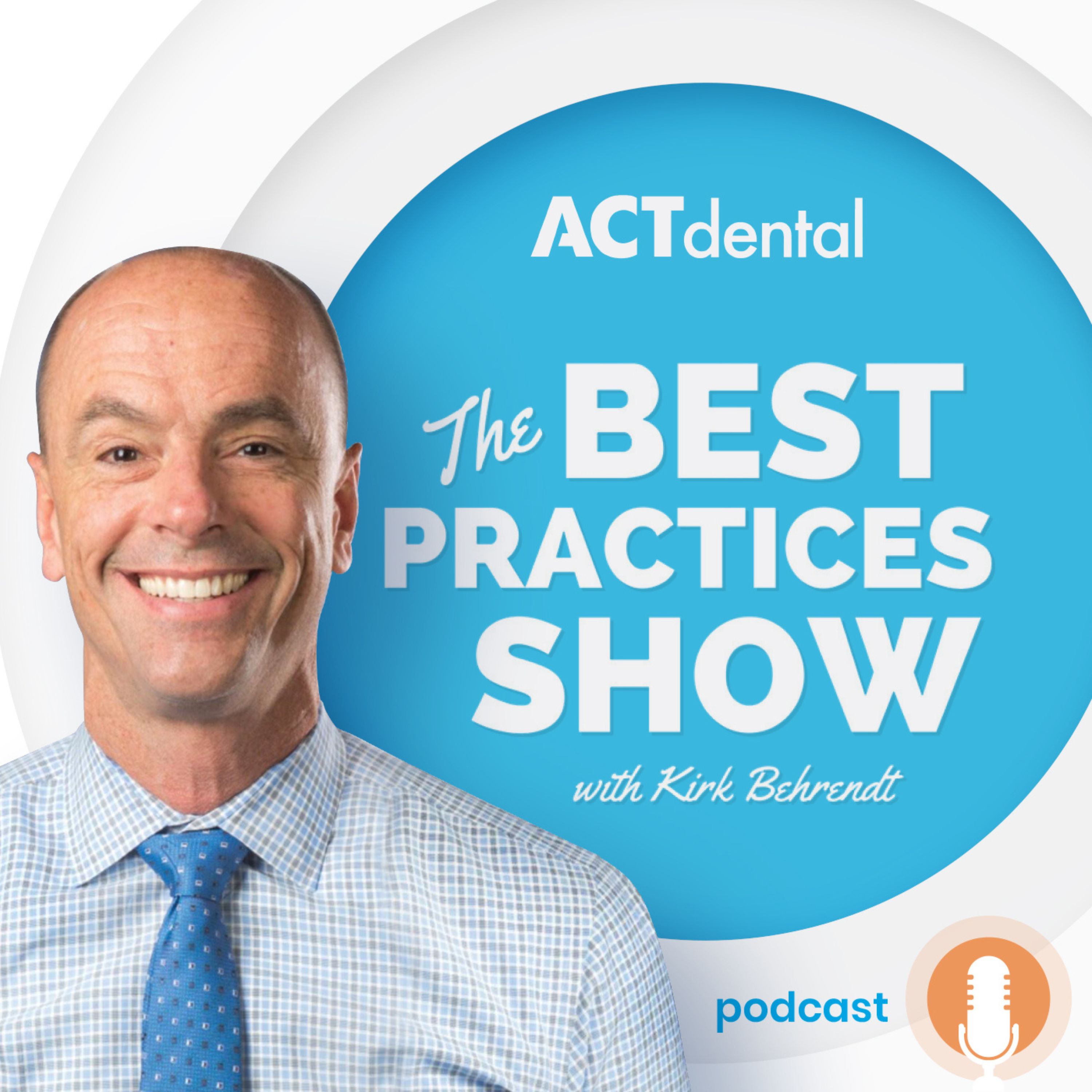Episode 515
515: Dr. Mark Hyman – at SmileCon
515: Dr. Mark Hyman – at SmileCon
In this special episode from ADA’s SmileCon in Houston, Texas, Kirk Behrendt brings back one of ACT’s favorite guests, Dr. Mark Hyman, to share some of the most valuable advice that every dentist and prospective dentist should hear. Dentistry is one of the best and most rewarding professions — you just have to put in the work. To learn how to make your future years in practice shine, listen to Episode 515 of The Best Practices Show!
Episode Resources:
- Dr. Hyman’s website: https://drmarkspeaks.com
- Dr. Hyman’s email: drmark@drmarkspeaks.com
- Dr. Hyman’s social media: @drmarkspeaks
- Subscribe to the Best Practices Show Podcast
- Join ACT’s To The Top Study Club
- Join ACT’s Master Class
- See our Live Events Schedule here
- Get the Best Practices Magazine for Free!
- Write a Review on iTunes
Links Mentioned in This Episode:
The 7 Habits of Highly Effective People by Sean Covey and Stephen R. Covey: https://www.simonandschuster.com/books/The-7-Habits-of-Highly-Effective-People/Stephen-R-Covey/9781982137137
Main Takeaways:
Learn how to be the best boss possible.
Success leaves clues. Learn from successful people.
Know what you are and aren't good at as early as possible.
Surround yourself with the best people in good and bad times.
Take care of your mind and body. Suffering is not a badge of honor.
Quotes:
“You can't get an arrow back once you shoot it. You can't get a bullet back once you shoot it. Once you say something to a teammate, the one time you humiliate a teammate, or correct them aggressively in front of a teammate or a patient, you never get it back. And you'll never have that same level of trust. And that's a shame. So, I try to be the best boss possible. Part of that was, know when to not say something because I'm not ready to say something constructive.” (2:31—2:54)
“You are on stage, and the team is watching. So, it’s okay to put yourself in time-out — or when you are asked a question by the team. There's a classic example. One December, a dental assistant came to her boss and said, ‘I've worked real hard this year. Can I have a dollar-an-hour raise?’ He’s like, ‘Sure.’ And this teammate went and told the entire team. Then, everybody wanted their dollar-an-hour raise. Times ten employees, times how many hours a year. It was a multi-multi-thousand-dollar boo-boo that wasn't anticipated. So, I love the thought that the doctor can say, ‘That's a good question. I'll consider it. Let me study this. I'll get back to you. Let me decide the raise I want to give to the entire team, because everybody is valuable.’” (3:25—4:06)
“One of the most frightening things for [young dentists] is their level of debt. And their role models, many of their role models have said, ‘It’s going to take you 15 years to pay off your school debt.’ And I try to tell them I can show them how to do it in 15 months if they trust me, if they trust the systems, and they get good role models, and good verbal skills, and some new clinical skills, and use equipment consistently.” (4:36—4:58)
“One of the biggest shames for me of dentistry is we buy some high-tech equipment, and we don't train on it.” (5:04—5:09)
“You don't have to do anything unless you want to be successful.” (5:41—5:44)
“I love three magic words: success leaves clues. What do the most high-impact, successful men and women in dentistry do? They spend a ton of time on their own personal self-growth. They educate the team. They liberate the team to use all of their talents. They bring in consultants and coaches that have skillsets different than they do. They celebrate and enhance their highest levels of skill, and they minimize their weaknesses.” (5:45—6:11)
“I knew what I wasn't good at, so I didn't do it. I hated endo. I didn't do it. I had 11 board-certified endodontists within 50 yards of my office. So, why try to find an MB2 canal when it’s not my joy, when I did a gorgeous root canal and showed the patient, and they're like, ‘That was a lot of money. Why does it still hurt?’ versus when I do veneers on someone and they break down crying, and hug me, and write me thank-you notes. So, I'm a pretty simple, lower-level paramecium of an animal, and I love that human response. I love the reward for my dentistry. It’s fine to be paid. But the emotional joy, and the five-star reviews, and people sending their friends, and the trust — that is the gift, to me. The gift of being part of people’s families.” (6:12—6:54)
“Part of figuring out what you're good at is, as the technology changes, and you get more continuing education, and you get positive feedback from patients, you go, ‘I want more of those hugs. I want more of those thank-you notes. I want the gifts delivered. I want the five-star reviews when I do the cosmetic dentistry that people can see.’ When I do the root canals, when I do apicos, the patient just says, ‘That was expensive,’ or, ‘That didn't take you long.’ So, for me, I'm a needy animal, and I need that joy and that feedback.” (7:56—8:23)
“So many speakers say, ‘Kirk, look at my 28-unit veneer, perfect case. Two visits, and we’re done.’ I'm like, ‘Yo mama. That's not the way it works.’ It didn't work that way for me. You had to re-impress. A provisional came off. You're cementing two of the veneers, and you put them in backwards. Life happens. So, to me, it’s not interesting that it happens, it’s how did you react to it. As a leader, do you throw things? The clients that you have had — I hope it’s not many — where a doctor throws instruments at the team, what a way to poison the well.” (14:23—14:50)
“If you really want to be an exquisite leader, you have to know you're on stage and you're being watched. And either you say, ‘I don't care. It’s my business. I'll do what I want,’ or if you really want a depth of commitment from the team, you don't do that. They know that they're safe, and you would never humiliate them, show them up in front of a teammate, in front of a patient, or guide and lead them out of fear.” (16:05—16:28)
“It’s classic Stephen Covey, habit five: seek first to understand, then to be understood.” (17:00—17:05)
“[If I could give my younger self advice], I think I would specifically try to take better physical care of myself because of how I physically ended up crumbling at the end of my career with my L4-L5 blown out, and arthritis/carpal tunnel, tennis elbow. Statistically, I did 90 years of dentistry in 32 years. So, dentists of my generation, that was a badge of honor, how much you lived out of the operatory. And that's stupid.” (17:51—18:15)
“I wish I had my 25-year-old body back and realized that the extra production that I did, it’s not worth it now.” (18:29—18:36)
Snippets:
0:00 Introduction.
2:24 Ways to be the best boss possible.
4:06 Get rid of your debt in 15 months.
5:10 Success leaves clues.
6:57 Figure out what you're good at.
8:23 How to find your best life partner.
12:52 Dr. Hyman’s next chapter and future seminars.
15:05 Bouncing mirrors in frustration.
17:26 Advice for his 25-year-old self.
18:39 Why it’s important to surround yourself with good people.
20:46 Last thoughts.
Dr. Mark Hyman Bio:
Dr. Mark E. Hyman is a renowned, full-time practicing dentist in Greensboro, North Carolina. He is a public speaker whose work is characterized by his warmth, enthusiasm, sense of humor, and passion for dentistry.
As an accomplished seminar speaker, Dr. Hyman has lectured throughout North America and internationally, receiving rave reviews. For the past 14 years, Dentistry Today magazine has selected Dr. Hyman as one of the top 100 speakers in dentistry. He is an Adjunct Full Professor at the UNC School of Dentistry in Chapel Hill, North Carolina, and has taught at The Pankey Institute in Florida and at Spear Education in Arizona.


